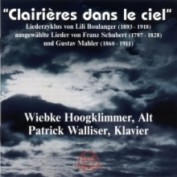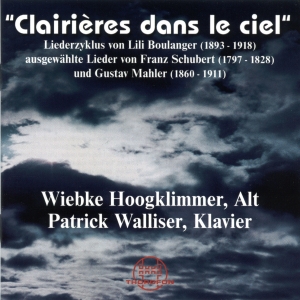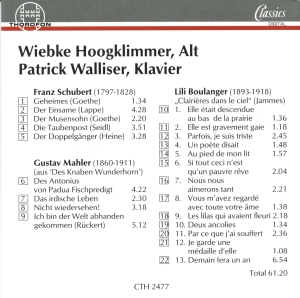Wiebke Hoogklimmer - Contralto, Producer and Director
Preface from the Booklet of the album "Clairières dans le ciel" (Wiebke Hoogklimmer, Contralto - Patrick Walliser, Piano)
Lili Boulanger was the younger sister of Nadia Boulanger, the famous teacher of composition. She was born on 21 August 1893 in Paris and died on 15 March 1918, a few days before Debussys death, at the age of only 24. She was the first woman to be awarded the Prix de Rome in the 110-year-old history of this most famous prize of musical life in France.
As early as at the age of three, Lili Boulanger accompanied her older sister, who took musical lessons at the Paris conservatory. The sisters came from a very musical family: their grandparents were musicians, their father - Ernest Boulanger - was a composer and their mother, who descended from the Russian aristocracy, was a singer and former student of her husband.
Because of her weak health - Lili had suffered from pneumonia in her early childhood - her school and music lessons took place on an irregular basis. Nevertheless she began to perform in public as a pianist and violinist as early as 1901. In 1907 Lili wrote down her first compositions, which she destroyed a few years later, however, when she took lessons in composition with Georges Caussade and Paul Vidal. In 1912 Lili Boulanger made her debut as a composer with her vocal quartet "Renouveau". Her cantata "Faust et Hélène", for tenor, baritone, mezzo-soprano and orchestra, made her win the already mentioned Prix de Rome in 1913, as well as a scholarship for the Villa Medici in Rome.
The outbreak of World War I and her weak health made Lili and her mother, who had accompanied her because of her illness, return to Paris prematurely. Back home, Lili resumed her composing, aware now, that an early death might prevent the completion of her intended works. In 1916 Lili took off for the Villa Medici once again, accompanied this time by her sister Nadia. In Rome, she set to music two psalms, "La Terre appartient à l'Eternel" and "Ils m'ont assez opprimé". After Lilis doctor had diagnosed her with a severe illness and predicted that she would possibly live for only two more years, she returned to Paris, exhausted, and wrote her famous "Pie Jesu". In addition to her vocal works Lili Boulanger composed music for piano, chamber music and some orchestral works.
The song cycle "Clairières dans le Ciel" (Clearings in the Sky) was composed in 1914, belonging musically to French Impressionism. Like Debussy, Lili was attracted to the Symbolist poetry of her time and, like him, she chose a work by Maurice Maeterlinck for her opera "La Princesse Maleine", which unfortunately remained unfinished. Among her songs there are two more settings to music of Maeterlincks poems.
In French Symbolism, which came to life in the literary world as a counter-movement to Positivism and Naturalism, the creation of an atmosphere takes precedence over an often negligible plot. True meaning is supposed to be hidden behind the words, in the silence between the words. Even if the poems of Francis Jammes do not show the same symbolic content and hidden secrets as, for example, the works of Maeterlinck, his cycle "Clairières dans le Ciel" can be said to belong to the Symbolist school, due to its pronounced symbolism of color and nature and its strong religiousness.
Francis Jammes was born on 2 December 1868 in Touray (Hautes Pyrénées) and died on 1 November 1938 in Hasparren (Pyrénées-Atlantiques). He was a friend of André Gide and Paul Claudel. In 1905 he converted to Catholicism and led a simple provincial life.
The main theme of his cycle of 24 poems called "Tristesse" is the unrequited love for a young girl and the lyric subjects subsequent longing for death. Lili Boulanger chose 13 poems from this cycle to be set to music and called them "Clairières dans le Ciel" (the title was also taken from Jammes, who had given it to a voluminous collection of his poetry, of which "Tristesse" was a part).
The number 13 had a very special meaning for Lili, who often mentioned it as a symbol for herself: her name consists of 13 letters, for the title page of "Clairières dans le Ciel" she chose a logo in which her initials LB resemble a 13, and her symbolic predilection for this number also figures in some of her other works. In Tarot, the number 13 represents, among other things, Death, and, considering that Lili Boulanger was very ill most of her life, with death looming over her ever so often, this fact bears an even more intimate meaning.
I transposed the cycle "Clairières dans le Ciel" for the alto voice, retaining the proportions of keys, and with these different keys the songs acquire a wholly new timbre, of course. The piano part is very exacting, because Lili Boulanger must have already had a conception of a later orchestration in her mind, while she was composing the songs. She managed to orchestrate 8 of the 13 songs, after all, and created wonderful timbres for them.
As "Clairières dans le Ciel" is closely related thematically to the "Winterreise" (1827) by Franz Schubert and the "Lieder eines fahrenden Gesellen" (1883/84) by Gustav Mahler, I combined on this CD Lili Boulangers cycle with selected songs by Schubert and Mahler. Contrasting Lili Boulangers treatment of the subject matter in Fin-de-Siècle Paris with that of the two male German composers seems to me of particular interest in this respect.
Franz Schubert was born on 31 January 1797 in Lichtenthal (Austria) and died of typhoid fever on 19 November 1828 in Vienna. His father, a school teacher, gave him his first violin and piano lessons; later on he was taught by Salieri and Rusicka. After having worked as a school assistant for his father, Schubert took to music seriously as a freelance artist. From 1818 to 1824 he held the position of private music teacher for the Esterházy family in Zelesz (Hungary). In addition to his considerable song writing, consisting of over 600 works, Schubert composed symphonies, chamber music, piano music, church music, operas and musical comedies.
Composer and conductor Gustav Mahler was born on 7 July 1860 in Kalischt (Bohemia) and died on 18 May 1911 in Vienna. He studied in Vienna, where he was a student of, among others, Anton Bruckner. After his studies he worked as a theatre conductor in Hall (Austria), Prague, Leipzig, Budapest and Hamburg. In 1897 Mahler became conductor, then director of the Vienna Court Opera, as well as of the Philharmonic Concerts. From 1907 to 1909 he was chief conductor of the Metropolitan Opera House in New York City and conducted the New York Philharmonic Orchestra from 1909 on. Mahler mainly composed symphonies and songs for orchestra.
Comparing the three cycles of these composers, it is remarkable that the "Lieder eines fahrenden Gesellen" by Gustav Mahler end on a comforting tone. In Schuberts "Winterreise", the figure of the organ-grinder can be interpreted as representing Death as well as a muse (and thus standing for a new beginning). In Lili Boulangers "Clairières dans le Ciel", however, the injury proves to be fatal for the protagonist.
(copyright Wiebke Hoogklimmer)
 |
CD "Clairières dans le ciel" If you are interested you can buy the album handsigned from me. Click on the cover or title for more informations! |
| Click here for the next programmes: |




